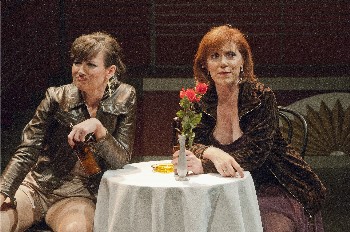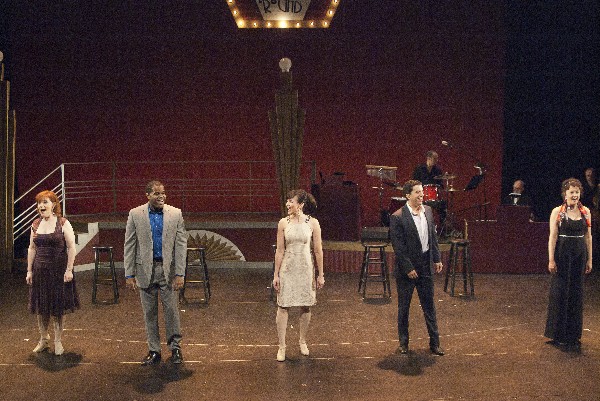Theater Review: Kander and Ebb’s Elegant and Understated “World”
While this revue of Kander and Ebb tunes doesn’t have a plot, much dialogue, or even named characters, it does contain stories, funny and touching vignettes of ordinary lives.
The World Goes ‘Round. Music by John Kander. Lyrics by Fred Ebb. Conceived by Scott Ellis, Susan Stroman, and David Thompson. Directed and choreographed by Ilyse Robbins. Music Direction by Todd C. Gordon. Scenic Design by Erik Diaz. Costume Design by Deidre McCabe Gerrard. Lighting Design by Deb Sullivan. Properties Design by Joe Stallone. Presented by New Repertory Theatre at the Arsenal Center for the Arts, Watertown, MA, through July 31.
By Alyssa Hall

Aimee Doherty and Leigh Barrett singing the tune Class in New Repertory Theatre’s THE WORLD GOES ‘ROUND. Photo: Andrew Brilliant / Brilliant Pictures
Following the lead of the smooth, jazzy, and personal songs in The World Goes ‘Round, New Repertory Theatre’s endearing production of the John Kander and Fred Ebb revue stays refreshingly understated, focusing on the talents of its five-person ensemble. The conceivers of the show mix comic and dramatic songs, solos and group numbers, and lesser known tunes with expected classics such as “All That Jazz.” The result is a well-paced evening that impressively showcases the range of local, powerhouse performers like Leigh Barrett and Aimee Doherty.
While The World Goes ‘Round doesn’t have a plot, much dialogue, or even named characters, it does contain stories, funny and touching vignettes of ordinary lives. Sometimes songs link to form a short narrative, such as a man’s proposal to a reluctant woman. Other times, only similar musical styles, design choices, and performances keep the show cohesive.
The costumes, set, and lighting are not particularly imaginative (singing “color it blue” results in the lighting changing to blue), but their elegant simplicity suits the intimate and polished production. Scenic Designer Erik Diaz’s streamlined, Art Deco-esque platform upstage (complete with a “K&E” bandstand section for the musicians) sets up multi-level action that enhances the retro feel of Kander’s jazzy music.
Similarly, Deidre McCabe Gerrard’s costumes, mainly sophisticated evening wear, are a suave touch. In comic songs, Gerrard’s outfits add visual comedy to already funny lyrics; For example, the stark contrast between a housewife’s pink, velour tracksuit and her famous friend’s gown and mink in “The Grass is Always Greener” enhances the awkwardness of the moment.
The designers wisely set the mood without distracting us from the show’s real attractions: Leigh Barrett (Woman #1), David Costa (Man #1), Aimee Doherty (Woman #2), De’Lon Grant (Man #2), and Shannon Lee Jones (Woman #3). The ensemble adeptly shifts from individual to group pieces, from funny to poignant, and from dances with props to five-part harmonies sitting still. Their easy chemistry allows for both relaxed silliness (like jerking about the stage in an exaggerated way as over-caffeinated coffee drinkers) and for convincing love scenes.
Leigh Barrett especially impresses with her acting range, sometimes, as in “The Happy Time,” transitioning between amusingly absentminded and heartbreakingly wistful in the same song. Aimee Doherty also stands out with her stage presence and powerfully accurate voice, managing with her earnest enthusiasm to make potentially obnoxious characters, like the rich girl who sings about how fortunate she is in “How Lucky Can You Get?,” endearing even before her doubts about her happiness are exposed.
Choreographer Iyse Robbins paces the show well, knowing when to liven it up with choreography utilizing the whole stage and when to let the actors sit still and put their voices and expressions at the service of Ebb’s moving and witty lyrics. The cast executes her fun choreography—with frequent use of props both expected (top hats, money-lined jackets) and unexpected (baby buggies, a shopping cart stuffed with Sara Lee pies)—with exuberance and ease.
As the title song “The World Goes ‘Round” points out, however, life includes both good and bad (“one day it’s kicks, then it’s kicks in the shins”). In the case of this revue, the predictable rehashing of a few standards serve as the kicks in the shins. Attempts to hew to the original staging, in such songs as “All that Jazz” (employing Fosse-esque choreography with top-hat-wearing men and silhouettes) and “Mr. Cellophane” (using the standard hand gestures and jokes about the spotlight operator), give us problematic mini-imitations rather than fresh musical approaches.
Although, laudably, the show tries to reimagine other songs, it doesn’t always succeed at that either. For example, making “Me and My Baby” from Chicago revolve around parents singing to their real babies, rather than a convict inventing a fake baby to manipulate the judicial system, strips the song of its complexity. Without the strong ironic undertones, the tune becomes overly simplistic and cutesy.
Still these missteps are minor, and the show, like the world in the title song, always keeps going on, successfully rethinking other songs, like “Class” from Chicago. The brilliant resetting—featuring two exceedingly trashy and tacky friends in a fancy restaurant—stands as one of the evening’s funniest numbers.
A bit strangely for a Kander and Ebb tribute, The World Goes ‘Round lacks the more socially relevant songs that are in many of their musicals: For example, sensationalism and crime as entertainment in Chicago, escapism and willful ignorance in Nazi-era Germany in Cabaret. Still, the revue effectively celebrates their ability to create compelling music that captures complex individual relationships and a variety of emotional states.
Late in the show, Woman #3 sings, “Happiness comes in on tiptoe / Well, what do you know / It’s a quiet thing.” For the most part, this production is also a “quiet thing,” an understated and elegant appreciation of Kander and Ebb charmingly performed by a talented ensemble that doesn’t need a lot of razzle dazzle to generate happiness.

